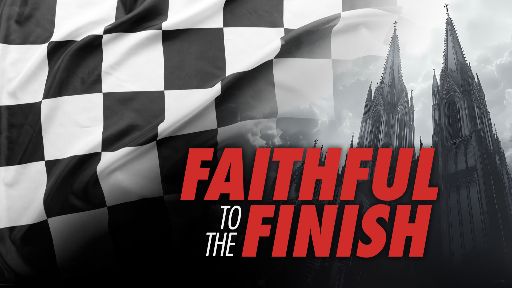-
Famous Last Words
Contributed by Jerry Shirley on Nov 28, 2017 (message contributor)
Summary: link inc. to formatted text, audio, PowerPoint.
Famous Last Words
John 19:28-30
http://gbcdecatur.org/sermons/famouslastwords.html
We've been studying the previous few chapters which record so much of Jesus' last teachings and instructions to His disciples. Now we fast-forward to His last 3 words: "It is finished."
It's a powerful truth: You can talk a lot and say very little. And sometimes you can say so little, but it mean so much.
The little word 'if'. It has 2 letters, but it's a very big word. There's so much meaning there.
Your 2 year old is drinking their Kool-Aid in the next room and you hear them say, "Uh-oh!" Soooo much meaning!
You are having an argument with your wife, and there's plenty of back and forth, and then she says one little word: "Fine!"
Is everything fine?
'It is finished.' 3 little words...actually just one in the original language. 'tetelestai' =
Note that He did not say "I am finished." The Pharisees thought that He was finished. These religious leaders orchestrated His execution. They planned a sting, manipulated those in authority, brought false witnesses, and got Jesus convicted in a kangaroo court. And as Jesus was taken away to be crucified, they no doubt congratulated themselves on their brilliant maneuvers. "He's finished!" they must've said.
But it was far from over. It was only beginning.
For 3 days the devil thought he had won. He and his demons of hell must have had quite a celebration, because their enemy was dead.
'Was' = another little word with a lot of meaning!
To some degree, even the disciples thought He was finished. They should have known better, because for months now Jesus had told them He would be killed, buried, and come back to life on the 3rd day. He told them at least 6 times that we know of.
And yet, as they walked away from that 'day of the cross' they were in despair, in hiding, and in doubt. "It's over. He's finished."
But Jesus didn't say I am finished, but IT is finished!
Tetelestai - it is finished:
1. A servant's word = task completed.
Slavery was common in those days. It was different from early US slavery. Many were in debt, and indentured as servants to masters to whom they owed money. They would be assigned a task, and when completed, they would return to their master and say tetelestai, the task is completed. "I did what you told me to do, in the way you told me to do it."
John 17:4 [Jesus prayed to His Father...]
I have glorified thee on the earth: I have finished the work which thou gavest me to do.
We should aspire to someday be able to say tetelestai to the Father.
2 Timothy 4:7
I have fought a good fight, I have finished my course, I have kept the faith:
O to hear from His lips, "Well done, good and faithful servant."
Make sure you are a servant in Christ's church. We are God's slaves, He owns us, and He is a wonderful Master whom we CHOOSE to serve, for He is worthy! We aren't saved to sit, soak, and sour, but to serve! It's how God's work is done on earth.
ill.--J.L. Kraft formed the largest cheese company in America in his day. He lived in Chicago, attending North Shore Baptist Church. He served as Superintendant of the Sunday School. W.A. Criswell was visiting from Dallas one day and asked, "How can you organize such a large s.s. when you must have so much work to do with your great cheese company. He replied, "God did not put me here to make cheese. That's the way I make my living. God put me here to do His work in His church." [pardon the cheesy illustration]
And whatever business God has you in, it is to support you in your real business of serving Him.
Did you know that tetelestai appears twice in Scripture? The other place is v. 28 = 'all things were now accomplished'. The task is completed!
2. A priestly word = a perfect sacrifice
This word was taken right out of OT worship, back when they had that elaborate system of animal sacrifices. God gave them that system for a time. The priest would examine the lambs brought for sacrifice, for they had to be without spot or blemish, so as to be a good picture of Jesus, the sinless Lamb of God Who was to come.
First, the priest would look in the lamb's mouth for anything wrong there. Next, the eyelids, and the ears, the hooves ... looking for imperfections. He would then run his hands thru the wool, looking for any dark hair. It had to be pristine white to qualify.
Once a lamb was qualified, the priest would hold it up and say [what would be translated in the Greek] tetelestai = this is a perfect sacrifice! It is finished. This is a sacrifice which will be accepted!

 Sermon Central
Sermon Central



